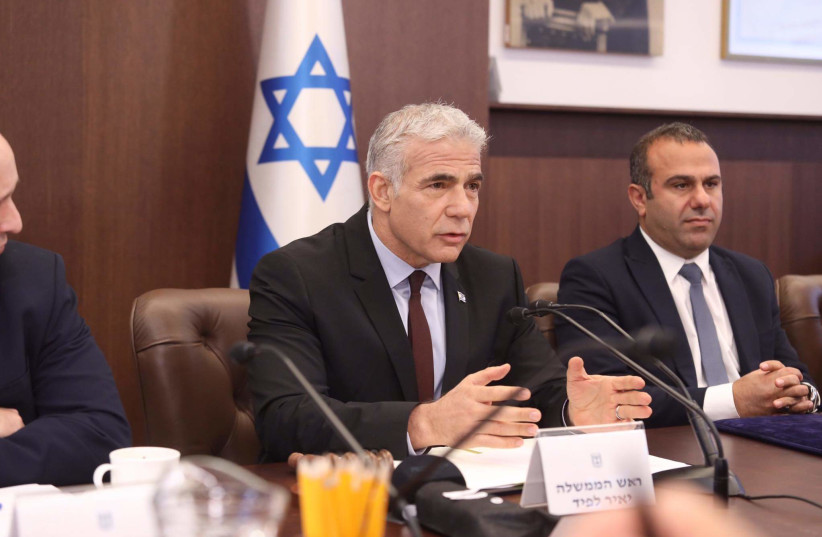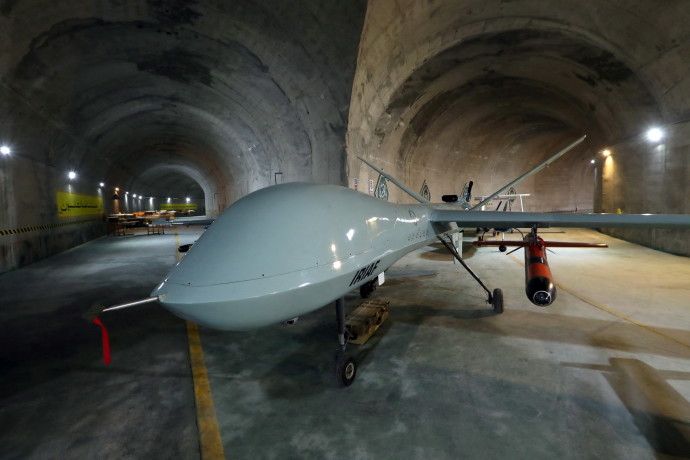“Hezbollah continues to terrorize and undermines Lebanon’s ability to reach a maritime agreement. Israel will continue to defend itself.”

Israel will defend itself and its assets, Prime Minister Yair Lapid warned on Sunday, a day after the IAF thwarted an attempted attack by Hezbollah on a gas rig in Israeli waters.
“The IDF shot down three hostile UAVs yesterday that tried to damage Israeli infrastructure in Israeli economic waters,” Lapid said at the start of his inaugural cabinet meeting as prime minister.
“In the coming months, our goal, of everyone at this table, is to run the government as if there is no coming election. The citizens of Israel are entitled to a functioning government at any given moment. This is the expectation from us, this is my expectation from my fellow ministers.”
Prime Minister Yair Lapid
Hezbollah’s UAVs shot down
“Hezbollah is continuing its acts of terror and damaging Lebanon’s ability to reach a maritime border agreement,” with Israel, Lapid said. “Israel will continue to defend itself, its citizens and its infrastructure.”
Lapid also referred to his new role as prime minister of an interim government, saying “in the coming months our goal, of all of us around this table, is to manage the government as if there is no election.
“The citizens of Israel deserve a functioning government at all times. That is the expectation from us,” he said.
The teachers’ strike, hospital budgets, and defense against Iran, Hamas and Hezbollah cannot wait, Lapid added.
“We must act on all fronts at any given time, and that is exactly what we’ll do,” he stated. “This government will continue to act for the good of the citizens exactly as it did over the past year.”
Lapid also called a meeting on COVID-19 for Sunday afternoon.
Israel and Lebanon have a long-standing dispute on the demarcation of their maritime border in the Mediterranean Sea, which has been subject to on-and-off US-mediated negotiations in October 2020.
The dispute between Lebanon and Israel, which began over a decade ago, involves an 860-sq.km. triangle in the Mediterranean Sea, which would be about 2% of Israel’s economic waters.
“This government will continue to work for the benefit of the citizens just as it has done all this past year. We will make decisions, we will implement moves, and we will continue to strengthen the economic, political and security power of the State of Israel.”
Prime Minister Yair Lapid
Israel entered the talks agreeing to split the area 58:42 in favor of Lebanon, which would like to start drilling for gas as soon as possible to help dig itself out of its ongoing economic crisis. The talks broke down in 2021 when Lebanon sharply increased its demands after four rounds of US-mediated talks, almost tripling the disputed area to 2,300 sq.km. to include the northern end of the Karish natural gas field.
In response, Israel prepared its own new map, doubling its demands. In June, Energean hooked up a production ship to the Karish gas field in Israeli waters about 80 km. west of Haifa, and planned to start delivering gas from the reservoir later this year. Lebanese President Michel Aoun claimed that the vessel entered “the disputed maritime area with Israel,” and threatened that, in Beirut’s view, “any action or activity in the disputed area represents a provocation and an aggressive action.”
Hezbollah, which in addition to being a terrorist group is a party in the Lebanese government, launched drones at the rig in the Karish field on Saturday, which the IAF shot down.
As reported by The Jerusalem Post

